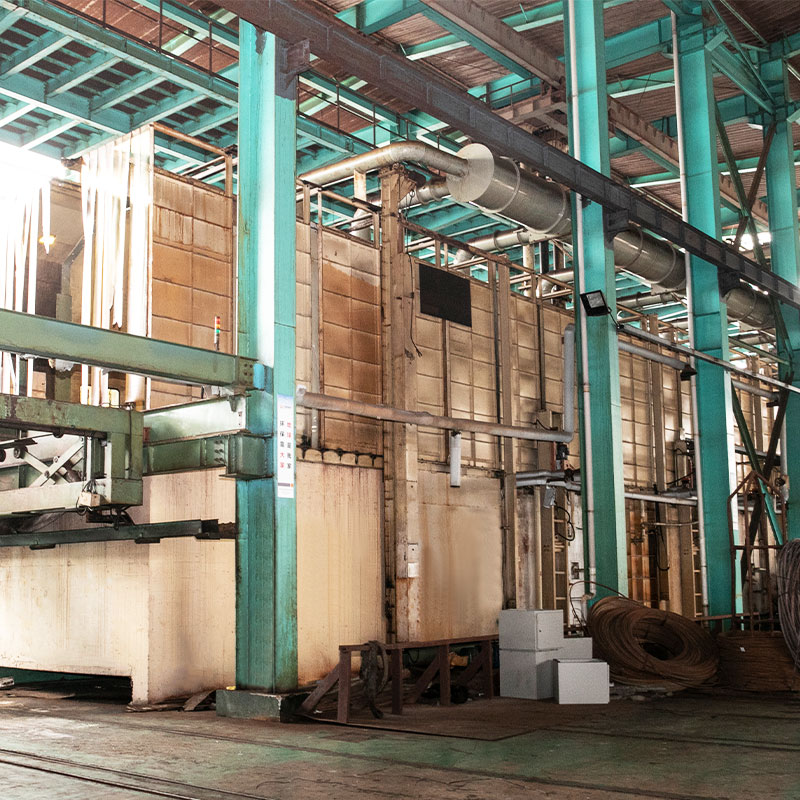Industry News
How do temperature extremes affect the performance of steel fasteners?
Brittle Fracture Risk: At temperatures below the ductile-to-brittle transition temperature (DBTT), steel fasteners become highly susceptible to brittle fracture...

Mild steel is carbon steel with a carbon content o...

Medium carbon steel is carbon steel with a carbon ...

Alloy steel In addition to iron and carbon, other ...

Bearing steel, also known as high carbon chromium ...

Fasteners must be manufactured from raw materials,...

Special-shaped steel refers to steel whose shape i...

The pickling phosphating process can impact the mechanical properties of steel, such as tensile strength and ductility, in several ways:
Surface Cleanliness and Defects: Pickling is a critical step in surface preparation, aiming to eradicate any impurities, scale, or oxidation layers present on the steel surface. This meticulous cleaning process ensures a pristine substrate, vital for achieving uniformity in subsequent treatments or coatings. However, the efficacy of pickling must be balanced with the risk of introducing surface defects. Pitting, etching, or surface roughening can occur if the pickling solution's composition, temperature, or immersion time isn't carefully controlled. These defects act as stress concentrators, potentially initiating cracks or reducing fatigue life, particularly in components subjected to dynamic loading or harsh environmental conditions.
Hydrogen Embrittlement Mitigation: Hydrogen embrittlement represents a significant concern, especially for high-strength steels or those operating in hydrogen-rich environments. The pickling process, particularly when employing acidic solutions, can bring about the evolution of hydrogen gas due to reactions with the steel surface. Proper mitigation strategies, such as post-pickling baking or selection of alternative pickling methods, are essential to minimize hydrogen uptake and mitigate embrittlement risks. Hydrogen-induced cracking can manifest as brittle fracture, jeopardizing structural integrity and necessitating stringent controls to ensure mechanical reliability in critical applications.
Phosphate Coating Characteristics: The phosphate conversion coating formed during phosphating serves multiple functions, including corrosion protection, surface passivation, and enhancement of coating adhesion. The composition, morphology, and thickness of the phosphate layer are influenced by various factors, including bath chemistry, temperature, immersion time, and substrate composition. While the primary focus of phosphating is surface enhancement rather than bulk property modification, subtle variations in coating characteristics can impact mechanical behavior. For instance, changes in surface roughness or topography may influence frictional properties, wear resistance, or fatigue performance, necessitating thorough characterization and optimization to meet specific performance requirements.
Residual Stress Management: Thermal and chemical treatments inherent in the pickling phosphating process can induce alterations in residual stress states within the steel substrate. These residual stresses, if left uncontrolled, can detrimentally affect mechanical properties, including tensile strength, fatigue resistance, and dimensional stability. The interplay between process parameters, such as immersion time, temperature, and chemical concentration, dictates the magnitude and distribution of residual stresses. Strategies for stress mitigation, such as controlled cooling rates or stress relief annealing, may be employed to optimize material performance and minimize the risk of stress-related failures in service.
Microstructural Integrity: While the primary objective of pickling phosphating is surface modification, it can inadvertently influence microstructural characteristics, particularly near the treated surface. Chemical interactions between the steel substrate and phosphating solution may result in localized changes in grain structure, phase distribution, or crystallographic orientation. These alterations, albeit subtle, can impart variations in mechanical properties, such as hardness, toughness, or deformation behavior. Understanding the intricate interplay between process parameters and microstructural evolution is crucial for tailoring phosphating treatments to achieve desired material responses while mitigating the risk of deleterious effects on mechanical integrity.


We are a source manufacturer of professional steel wire, we also have our own international trade department, we produce and sell by ourselves.
Ningbo SunRise Refined Metal Wire Material Co., Ltd. is China Custom How does the pickling phosphating process impact the mechanical properties of steel, such as tensile strength and ductility? Suppliers and How does the pickling phosphating process impact the mechanical properties of steel, such as tensile strength and ductility? Factory. We not only brought in 10 sets of spheroidizing annealing furnaces, dozens of metal wiredrawing equipments and twoworld's leading automatic phosphating pickling lines, but also engaged senior engineers as consultants fromTaiwan. The raw material that we use are supplied by the well known suppliers such as Bao Steel Co., Ltd and Xingtai lron & Steel Corp., Ltd. Also, the domestic lron & Steel manufacturers can be nominated by our customers.
We mainly produce steel wire made of alloy steel, bearing steel, free-cutting steel, high-quality carbon structural steel, low-alloy high-strength structural steel and other materials as raw materials. The annual output is 360,000 tons. It is one of the largest finished wire production bases in Ningbo. We serve all kinds of fasteners, special-shaped parts, automotive fasteners, wind power, petroleum and other fields. Ningbo SunRise is able to meet the high quality requirements of our customers throughout the whole operation process from raw materials to finished products.
Brittle Fracture Risk: At temperatures below the ductile-to-brittle transition temperature (DBTT), steel fasteners become highly susceptible to brittle fracture...
Corrosion Risk: Despite the enhanced corrosion resistance imparted by the phosphate coating, the steel can still be susceptible to corrosion under certain condi...
Directionality of Brushed Lines: Brushed process steel is characterized by fine, linear abrasions that create a distinctive surface texture. Under directional l...
High Hardness: Bearing steels are engineered to achieve specific hardness levels necessary for withstanding heavy loads and maintaining dimensional stability. T...
Contact Us
Your email address will not be published. Required fiels are marked